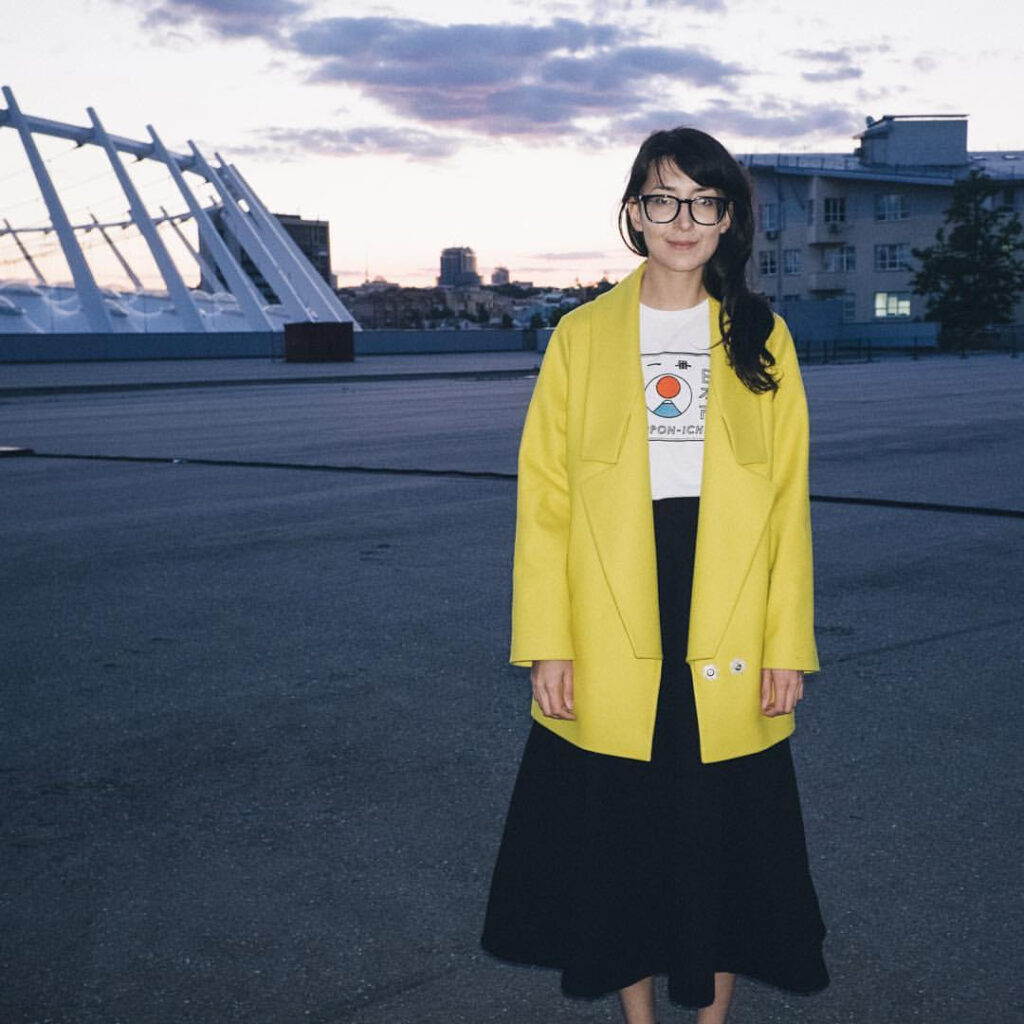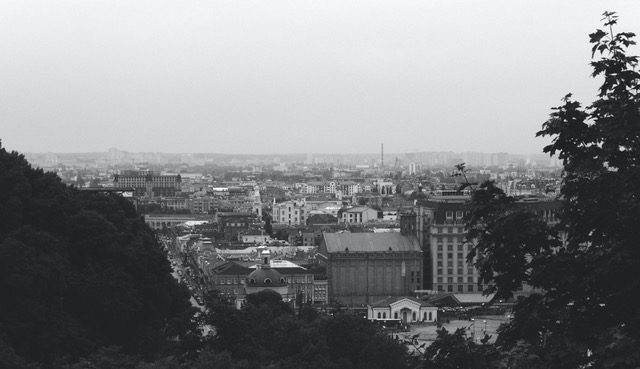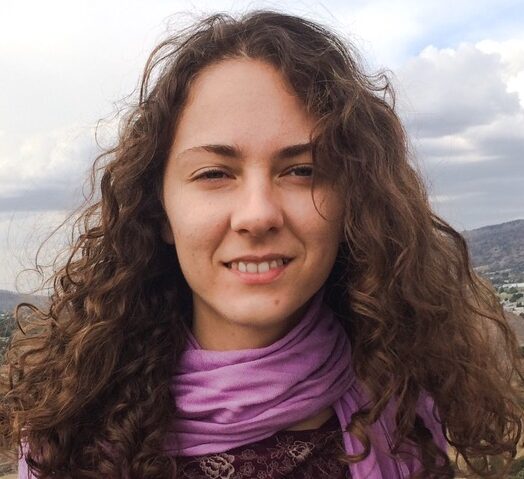Kyiv’s New Music Scene Today: Composing and Listening in the Time of War
On February 24, 2022, after Russian forces attacked the Ukrainian capital, Kyiv, award-winning curator Sasha Andrusyk posted on social media: “I’ve lived a very happy, very full life in Ukraine, and I intend to continue. The end of [Putin’s] Russia is fast approaching.” Despite the expectation of further attacks and the frequent sounds of air raid sirens that continued daily for at least two months, she has remained in the city with her entire family, which includes a baby and a toddler, determined to stay “until victory.”
A big part of what Andrusyk alludes to by “a very happy and full life” is her dream, realized over the past ten years, to make Kyiv an exciting center for new music. In 2012, she co-founded, together with Eugene Shimalsky, a music organization named Ukho (The Ear), which has since presented more than seven hundred works of contemporary classical music from around the world. Having moved from Kyiv to New York in 2010, I paid annual visits to Ukraine. My favorite of Ukho’s projects—a series of performances called Architecture of Voice—reminded me of some of the most exciting site-specific events organized by the Lincoln Center and the Guggenheim Museum.
The series aimed to create experiences that illuminate specific locations with music, thus allowing listeners to appreciate their city and its history in a new light. Luciano Berio’s Sequenza III was presented in a baroque church that had been transformed into a school gymnasium by the Soviet authorities and then back into a church in the 1990s. At the same time, well-known compositions received fresh interpretations in unexpected locations, such as John Cage’s Song Books at the Dynamo Kyiv soccer stadium. The repertoire of this project also included vocal improvisation, electronic music, and solo and choral works by Ukrainian composers, well-established and young, performed in the most unexpected places, among them an underground overpass, a paleontological museum, and two swimming pools.

Sasha Andrusyk in June 2016. Photo by Artem Nadyozhin.
Even though I was surrounded by New York’s wealth of new music, I was eager to learn how Ukho would emerge from its COVID slumber. When the current war broke out, Andrusyk had thirty music events planned for 2022, yet now it is clear that most of them have to be postponed. As she explained in a video call in early June (one hundred days into the war), her team now has to think not only about listener safety, but also audience attention span. The sound of air raid sirens is intolerable in Kyiv, as its hilly landscape produces multiple echoes. “We are all tired of the noise; it would be hard to concentrate on a long piece of music,” she told me. “So now I am thinking about a new program, called ‘Music of Consolation’: pop-up performances of shorter pieces.”
The devastating war, which has entered its fourth month as of this writing, has been framed as an assault on culture and has triggered global interest in Ukrainian music. The Kyiv Symphony Orchestra has toured Europe’s major concert halls, performing primarily Ukrainian repertoire. The New York Times has published an article about Ukraine’s major living composer, Valentyn Silvestrov, as well as an overview of early twentieth-century Ukrainian music. Yet, the younger generation of composers, who define an important part of Kyiv’s cultural life, remain little known to listeners outside Ukraine. In this essay I want to introduce some of them, reflect on what is at stake for them musically, and discuss their experiences of composing, listening, and living during a time of war.
None of the music performances described above would be imaginable without an independent Ukraine. Like much of the vibrant new music scene, Andrusyk’s creative vision is supported by young artists and private sponsors, many of whom came of age in an independent, democratic state. Long under Russian domination and deprived of sovereignty within the Soviet Union from 1922 until 1991, Ukraine has struggled to shape its own art music institutions and participate in global musical modernisms. Since the 1930s, the Soviet government limited artistic freedoms, confining all arts to the only acceptable aesthetic principle of socialist realism. Scholars have shown that socialist realism was not clearly defined in terms of musical expression, yet its key characteristics, such as ideologically acceptable subject matter and accessible, traditional (i.e. tonal) idioms were strictly imposed until the end of Stalin’s rule in 1953. As music scholars Peter Schmelz and Kevin Karnes have discussed, in the 1960s composers in Russia and Estonia still suffered repercussions for their exploration of the techniques and sounds of the postwar European avant-garde, but none of them were tangibly punished.
In Ukraine, however, composers Valentyn Silvestrov (b. 1937) and Vitaly Godziatsky (b. 1936) were expelled from the Soviet Composers Union in 1970 because of their modernist compositions. They were deprived of income from composition and teaching for almost three years. My own ongoing research with archival sources and eye-witness accounts in Ukraine, Russia, Estonia,and Armenia, shows that the official pressure on composers was much stronger in the Ukrainian Soviet Socialist Republic during the Soviet Union’s final two decades. Art historians and literary scholars have also demonstrated that the repression of Ukrainian culture in general was stronger than elsewhere in the USSR.
With this history of Russian censorship in mind, the resistance to invasion, especially among cultural figures, is not surprising.
Composers in the Soviet Union were able to accept foreign commissions only through a centralized system based in Moscow. According to Silvestrov’s correspondence, the composer encountered multiple obstacles with payment for performances of his compositions in the West, where they were in high demand. Under Russian domination, Ukraine could not promote its culture abroad without permission from Moscow. With this history of Russian censorship in mind, the resistance to invasion, especially among cultural figures, is not surprising.
Favorable working conditions made the recent transformation of the Ukrainian contemporary music scene possible, ushering in that burst of creativity and a diversity of new works, music festivals, and multimedia performances. Many of today’s prolific composers came of age in an independent Ukraine and have never experienced Soviet-style censorship. My first memorable encounters with live new music in Kyiv were in 2007, at concerts organized by composers of this young generation, Alexey Shmurak (b.1986) and Maxim Kolomiiets (b.1981), who then led the Ensemble Nostri Temporis. Some members of this group attended International Summer Courses for New Music in Darmstadt (Germany), others master classes led by foreign composers in Ukraine. These learning experiences helped shape their creative development and fostered collaborations with musicians from around the world, leading to increased performances abroad, foreign commissions, and grants. The freedoms afforded by democracy certainly allowed Ukrainian composers to be equal participants in the global new music community, even though they had to face all the challenges of the free market system.
Freedom, however, is not freely granted. The Russian invasion, which was triggered in part by Ukraine’s closer integration into the world’s democratic community, puts the lives of Ukrainian musicians at risk. The following snapshots, based on interviews and social media posts, describe the range of their emotions and responses to both the the war itself and the sounds it engenders. Over the past three months, I have observed that an overwhelming majority of composers have remained determined to continue making music despite unprecedented circumstances – some from the very beginning of the invasion, others after overcoming an initial shock and getting accustomed to the new circumstances.
From the very first days of the Russian attack, composers based in Kyiv have reported their discomfort with the sounds of air raids on social media. Victoria Polevá (b. 1962) posted statements about sirens she heard during the first week of the invasion, when she started composing a musical setting of Psalm 90. (The text addresses a community’s plea for God’s help during crisis; the work was prompted by the war.) As she noted on Facebook on February 28: “It is funny to compose music during the war—for some reason the air raid alarm always sounds at the most inconvenient moments. So much time is wasted in the basement!” Later that day she reported that there were six raids within three hours.
To illustrate her feelings on the sixth day of the war, Polevá posted a recording of her work Ono for symphony orchestra (2004), which she described as a “premonition of a terrible inhuman war with ‘Warm Prayer’ at the end.” The works she posted online in the following days provide insight into her emotional response. Day seven: Sermon to the Fish (2020). Day eight: No Man is an Island, a cantata on John Donne’s poem, which the composer believes expresses “the courage of persevering till the end.” Day nine: Psalm 50 (2000). Two weeks following the invasion, Polevá reluctantly fled to Poland, and later to Germany, where she was able to finish the setting of Psalm 90.
Not only are sounds intolerable during war, but also silences. Maxim Kolomiiets described his experience of silence in Kyiv on the ninth day of the war in a Facebook post. At that point many residents had left, and it was too dangerous to go out to the streets: “Empty city. The silence one could have only imagined elsewhere, described in books, apparently can exist right here—and its proximity [is shocking].” This “ominous silence” reminded the composer of the scene “War” from his opera Night (2020). Kolomiiets was unable to travel to the performance of his work, Echoes of drowning reflections (2013), at the Cologne Philharmonic a week later because of martial law. He wrote that he had imagined this event under completely different circumstances: “For many years I have dreamed that my work would be performed [there]…And now I am sitting in Kyiv in front of the monitor looking at this dream venue and hearing sirens and air defense blusters outside the window.”
The sounds of the war have no doubt impacted composers in Kyiv; but they are also experiencing psychological shock because the war was so unexpected. This is discernible in online discussions and interviews. Alexey Shmurak is one of the most affected. Born in Saint Petersburg, he frequently performed and taught in Russia and premiered many works of young Russian composers as a pianist in Ensemble Nostri Temporis. His project “Hysterical Dog,” humorously-philosophical Russian-language songs, was welcomed in an experimental music club (Dom) in Moscow in 2019. Two weeks into the war, however, Shmurak told CNN’s Anderson Cooper that he will never go to Russia again. His relatives in Russia have supported the war. Many of his friends and colleagues there expressed no condolences, and some of them embraced the invasion, according to his complaints on Facebook during its first weeks. The feeling of betrayal, shared by many Ukrainian musicians, which Shmurak expressed in a poem, will have a prolonged impact on music collaborations in the region after the war is over.
Many composers found it difficult to make music during the first weeks of the war, as Roman Grygoriv and Illia Razumeiko explained in several interviews. Once airstrikes hit Kyiv, they relocated to Ivano-Frankivsk in western Ukraine. Three weeks into the war, on March 16, the duo recorded a seven-hour performance of their work Mariupol for dulcimer and a microtonally retuned bandura, a lute-like plucked instrument. The piece was conceived shortly before the invasion as a structured improvisation lasting about ten minutes. In a recent interview Razumeiko stated that they chose bandura because it is a traditional Ukrainian instrument, and dulcimer because, to them, it represents “something that unites different people” since many nations have a version of dulcimer. The composers called the piece Mariupol after a port city that had been struggling to maintain autonomy during the so-called hybrid war in Donbas. “The war was already in the air,” Razumeiko explained, “then the [full-scale invasion] started and the [work] acquired a completely different meaning.”
Listening to a 45-minute recorded excerpt of Mariupol in New York almost a month into the war when it was presented at the Ukrainian Contemporary Music Festival, I could not stop crying. The striking of strings with drumsticks produced a sharp rattling noise, which was almost unbearable at times, while the final, quieter, gestures created a feeling of emptiness. This first large-scale musical response to the ongoing war allowed me to perceive through sound the experience of trauma of an entire city along with its civilian population being leveled to the ground. This is an experience which, I think, defies verbal expression. Although I have never been to Mariupol and do not have any personal connection to the city, reading of news reports about bombed civilian targets triggered a sense of paralysis.
The music helped temper unbearable shock into tears. As one listener mentioned in a post-concert discussion, the piece “was difficult to listen to, but very appropriate.” Grygoriv and Razumeiko’s Mariupol also embodies what I have observed as the mixed feelings experienced by many Ukrainians in these months of war, whether people remain at home, fled within the country, or have temporarily relocated abroad. To me, the stamina demonstrated by the performers across the work’s sheer length reflects one prevalent narrative, encouraged by Ukrainian President Volodymyr Zelensky: “We will win and rebuild our country, no matter what.” The violence of the sounds projects the shock, whether at the ground level of atrocities committed by Russian soldiers in Mariupol or at the fact that the international community was unable to stop them.
In a brief essay, posted two months into the war, Sasha Andrusyk has evoked the latter mixture of sentiments:
I keep my passport in an old cover; there’s a smiling alien in a scarf and an inscription that says, “citizen of the galaxy.” There are two problems with it now. The inscription is in Russian, and the phrase suddenly reads impossibly imperial (“only galaxy is enough”); this is minor, though. What’s worse is that I no longer know what galaxy I can rely on.
About the Roundtable, “Musical Lives of Ukraine”
This post is the first of a three-part roundtable, “Musical Lives of Ukraine,” commissioned after the full-scale invasion of Ukraine by Russia on February 24, 2022. The roundtable participants open worlds of musical life past and present in Ukraine, writing out of their experiences of music and Ukraine during the war. For more on music and the war in Ukraine at Musicology Now see: “Music from Ukraine: A Collaborative Portrait Gallery in March 2022” and Adriana Helbig’s “Ukraine’s War-Time Pianos and the Sounds of Resistance.”



